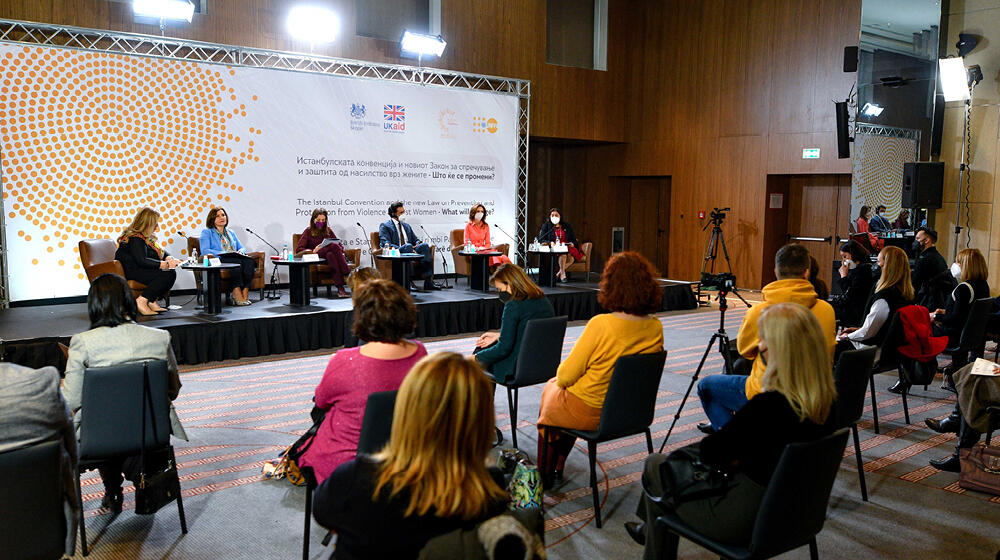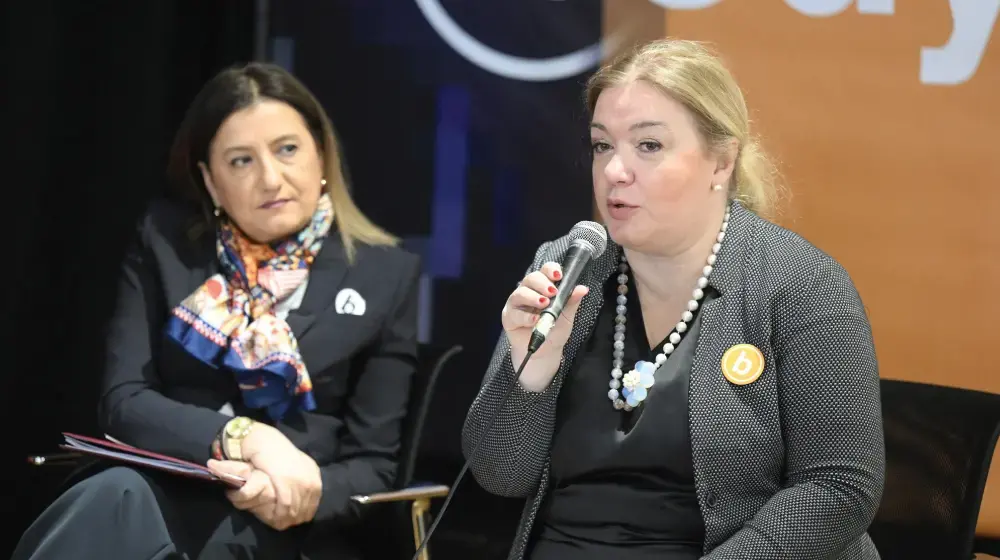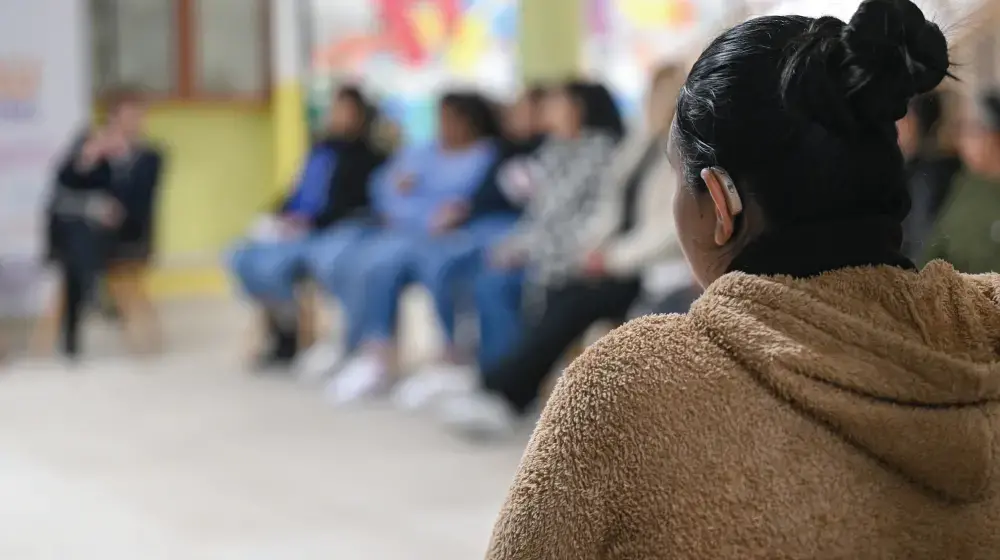Skopje, 09 December 2021 - The panel discussion on the topic: "Istanbul Convention and the new Law on Prevention and Protection of Violence against Women" marked the beginning of the project "Prevention and Protection against Gender-Based Violence in North Macedonia", funded by the British Embassy in Skopje and implemented by UNFPA.
Its purpose is to support the Government of North Macedonia to embed and begin implementing state-wide integrated policies on gender-based violence, in accordance with the principles of the Istanbul Convention.
"We are talking about the most burning issue in the world and within our country, which requires urgent solutions and answers regarding gender-based violence. The process of ending gender-based violence is at the heart of UNFPA’s work. Its elimination means achieving full gender equality and is one of the three global goals of UNFPA that it strives to achieve by 2030," said the Head of the UNFPA Office in North Macedonia, Afrodita Shalja Plavjanska.
Statistical data show that urgent solutions are needed: one in ten women is a victim of physical violence, thirty per cent of women are victims of sexual harassment, two out of five women are victims of psychological violence, and one in five women personally knows a relative, friend or neighbour who has experienced some form of domestic violence. Compared to women of EU countries, three times as many women believe that domestic violence is a private matter and should remain within the family, and some even believe that minor violence is normal behaviour.
The Minister of Labor and Social Policy, Jagoda Shahpaska said that as an MP she had the privilege to vote for the Istanbul Convention in the Parliament, and now as a Minister together with all the institutions, the NGO sector, UNFPA and the British Embassy is working vigorously to develop tools arising from the Law on Prevention and Protection against Violence against Women and Domestic Violence.
"I am proud that this Law was adopted by consensus in January last year and the MPs from the government and the opposition voted for it together which means that the violence against women is not a private matter, it does not recognize political affiliation, the environment in which the victim lives, educational level of victims and perpetrators, thus, it is simply the most drastic violation of human rights and freedoms. With the adoption of the Law, for the first time, due care is introduced by the relevant institutions and individuals. This means that all those who have indications or who have witnessed the perpetration of violence against women, gender-based violence or domestic violence have an obligation to report it. Otherwise, the victim has the right to initiate a procedure before a civil court since this legal obligation was not respected with due care," stated Minister Shahpaska.
She emphasized that for these efforts to become a success story of, dealing with violence against women and girls and gender-based violence, all the links in the coordinated struggle chain should equally contribute.
The rights of women and girls, gender equality and ending gender-based violence are a priority in the UK's foreign policy.
The ambassador of the United Kingdom, HE Rachel Galloway, recalled the statement of the Head of the British diplomacy Liz Truss that women and girls are at the centre of the foreign policy of the United Kingdom, and that includes giving priority to activities aimed at ending violence against women and girls.
She highlighted that everyone should work to fulfil the Istanbul Convention in accordance with the new law, and the purpose is "to create a society where women and girls will reach their full potential".
- "I am proud that we will begin a three-year project with UNFPA, in order to support the government in North Macedonia with the implementation of the policies to prevent gender-based violence in accordance with the Istanbul Convention. "The purpose of the project is to improve the victim services, by enhancing the availability and capacity building of victim services", said Ambassador Galloway.
The Head of Cooperation in the EU Delegation to North Macedonia, Steffen Hudolin, emphasized that the Commission encourages the institutions in the country to eliminate gender-based violence and put it at the top of their agenda. Furthermore, he emphasizes that the purpose is not only to address the consequences, but also the causes that lead to gender-based violence, which includes removing stereotypes, empowering women in the economy and achieving gender balance.
"My wife and I have three daughters and one son. According to the statistics, we have heard, according to these shocking data, one of them will be a victim of violence. This is something that is not acceptable to me, to you, to society, the institutions, or to anyone here. "However, in the 21st century, gender-based violence is still happening and it is sad, tragic and shocking that it remains unreported and often undetected", said Hudolin.
The panel discussion was also attended by the wife of the President, Elizabeta Gjorgievska, who pointed out that tackling the gender-based violence should be a daily obligation and responsibility - the victims should be encouraged to report, the institutions should provide impeccable protection, and the judicial authorities should respond in a timely manner.
"Just because the victim's scars are not visible, it does not mean that there is no violence. It is often necessary to encourage the victims to report violence, as they, unfortunately, face shame and fear and this puts them in a hopeless situation. It is also very important that victims have easily accessible information about support services, it is necessary to know that they will not face accusations, stigma. They are often not condemned to take steps, because they are not sure that they can get immediate help, they are not sure that they can survive economically. I will welcome the process of operationalization of the Law on Prevention and Protection against Violence, which provides the functionality of services and mechanisms that will strengthen the support for violence against victims," said Gjorgievska.
The UN Resident Coordinator in the Republic of North Macedonia Rossana Dudziak said that in the fight against gender-based violence it is important to involve the whole community and if everyone does their part, the victim will receive the support and will not be stigmatized.
" To root out a policy of zero tolerance for gender-based violence in every segment of our life. In this process, it is especially important to follow the principle that no one will be left out, because those who are left out are victims of violence, including gender-based violence. To create a safe environment in which any case will be reported and treated with appropriate support, not only from the institutions but also from the community," said Dudziak.
The panel discussion took place within the framework of the campaign 16 Days of Activism Against Violence Against Women and Girls.





